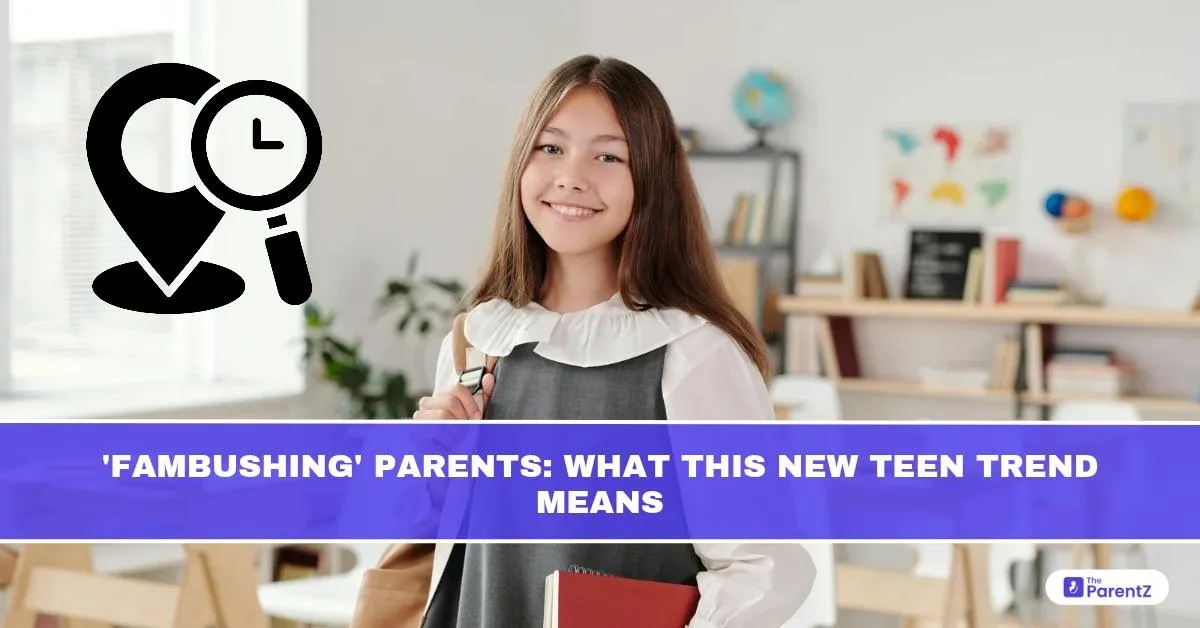If you’re a parent of a teenager, you might have noticed something a little strange happening lately. Maybe you popped into Starbucks for a quick coffee, and just as you were about to order, your phone buzzed with a text from your teen: “Grab me a pink drink, please!” Or perhaps you were enjoying a quiet lunch out, only to look up and see your child walking in, grinning and ready to join you. This isn’t just a coincidence or a sixth sense. It’s a new trend called “fambushing,” and it’s sweeping through households everywhere.
Let’s break down what fambushing is, why teens are doing it, and what parents can do to understand and communicate better with their kids in this new digital age.
What Exactly Is Fambushing?
Fambushing is a mashup of “family” and “ambushing.” It’s all about teens using location-sharing apps to track where their parents are, then either messaging them with requests (“Can you pick up snacks?”) or showing up in person, totally unannounced. Think of it as the reverse of what many parents have been doing for years—using apps like Life360 or Apple’s location sharing to keep tabs on their kids for safety. Now, the tables have turned.
Apps like Life360, SnapMap on Snapchat, and Apple’s Family Sharing have made it incredibly easy for everyone in the family to know where everyone else is at any time. Gen Z, the first generation to grow up fully immersed in the digital world, is especially comfortable with this kind of tech.
How Does Fambushing Happen?
It usually goes like this: a parent heads out for errands, lunch, or maybe a quick coffee run. Their teen, scrolling through their phone, spots their parents’ location at a favorite spot—maybe Chipotle, Target, or a local café. The teen either sends a message with a request (“Can you get me a burrito?”) or if they’re feeling bold (or hungry), they show up in person for a little surprise visit.
This trend has even gone viral on TikTok, with teens and parents sharing funny stories about unexpected meetups and surprise snack attacks. Some parents find it sweet and wholesome, while others feel like their privacy is being invaded.
Why Are Teens Doing This?
There are a few reasons why fambushing has caught on:
- Connection: Despite all the jokes about teens glued to their screens, many are looking for ways to connect with their parents, even if it’s just for a few minutes over lunch or coffee.
- Convenience: Teens are practical. If they know you’re at Starbucks, why not ask for their favorite drink? It saves them a trip and gets them a treat.
- Safety and Comfort: For some, knowing where their parents are brings a sense of security. Location sharing isn’t just about control—it’s about feeling connected and safe, especially for Gen Z, who value safety highly.
- Just for Fun: Sometimes, it’s about the thrill of the surprise or the fun of catching a parent off guard. It’s a lighthearted way to interact, and it makes for great TikTok content.
What Parents Need to Know
If you’re feeling a little “fambushed” yourself, you’re not alone. Many parents are surprised by how the technology they once used to keep their kids safe is now being used to keep tabs on them instead. Here’s what you should keep in mind:
1. It’s Not Always About Control
Teens aren’t necessarily trying to invade your privacy or control your every move. For many, it’s a way to feel close and involved. Location sharing has become second nature for Gen Z, and they often see it as a tool for connection, not surveillance.
2. Boundaries Are Important
It’s okay to set boundaries if you don’t want your teen to show up unannounced when you’re out with friends or on a date. Open conversations about privacy and mutual respect go a long way.
3. Communication Is Key
Use fambushing as an opportunity to talk about digital boundaries, respect, and trust. Explain how you use location sharing for safety, and ask your teen how they feel about it. Let them know when it’s okay to join you and when you’d rather have some alone time. Encourage them to ask before showing up, just as you would for them.
4. Remember the Sweet Side
While it can be a little annoying to be “fambushed” during your rare solo Target run, try to see the humor and sweetness in it. Many parents have shared that these surprise encounters have led to fun memories and extra bonding time. Sometimes, it’s just about a free snack or a quick hello, but it’s also a sign that your teen wants to be around you, even if they don’t always say it out loud.
5. Stay Safe and Smart
Location sharing is a powerful tool, but it comes with risks. Remind your teen (and yourself) to only share locations with trusted family members. Make sure everyone understands the importance of digital privacy and knows how to manage their app settings.
Conclusion
Fambushing is a perfect example of how technology is changing family dynamics in unexpected ways. It’s a little bit funny, a little bit annoying, and, at its core, surprisingly wholesome. If you find yourself on the receiving end of a fambush, take a breath, laugh about it, and use it as a chance to connect with your teen. Set some boundaries, keep the conversation open, and remember that in this era, a surprise lunch with your kid might just be the highlight of your day.





Be the first one to comment on this story.